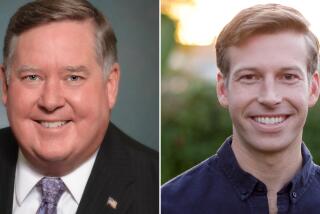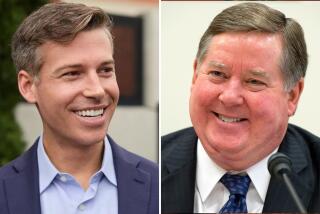JUDICIAL / CULVER MUNICIPAL COURT : 2 Contenders Vow to Make Services More Accessible
- Share via
U ser-friendly is not a term often used to describe the Los Angeles County judicial system, but both candidates seeking the Culver Municipal Court seat up for grabs Nov. 8 have pledged to make the court more accessible.
How?
“It would be helpful to have a night court so that citizens wouldn’t have to take time out of work,” said one of the candidates, Allan J. Goodman, 48, a former California deputy attorney general now in private practice.
That’s also the position of Goodman’s rival--Paul A. Jacobs, 52, a 15-year-veteran of the Culver City Council who is working as a consultant for several law firms.
The two men are competing for a seat that has been held for nearly 25 years by Judge Harold I. Cherness, who is retiring at the end of this year. Seven candidates ran in the June primary, which ended with Jacobs and Goodman as the top two vote-getters. Because neither candidate won more than 50% of the vote (Jacobs finished with 31% and Goodman with 24%) a runoff was scheduled for Nov. 8.
Next Tuesday’s race will be decided by voters in the five communities covered by the Culver Municipal Court--Marina del Rey, Ladera Heights, Windsor Hills, Fox Hills and Culver City. Each of the court’s two judges serves a six-year term and can run for reelection.
Both Goodman and Jacobs have received a “well-qualified” rating from the Los Angeles County Bar Assn.
Jacobs, who advocates punishing criminals to the fullest extent allowed by law and who would punish certain juvenile offenders as adults, also supports using alternatives to the court system for the resolution of some legal disputes.
“I’d like to see alternative ways that are less costly--arbitration and mediation,” Jacobs said. “And I’d like to see the Legislature expand the jurisdictional limits of small claims courts to add more judge pro-tem to resolve smaller disputes.”
Among Jacobs’ supporters are U.S. Rep. Julian Dixon, Los Angeles County Supervisor Yvonne Brathwaite Burke and Los Angeles City Councilman Zev Yaroslavsky.
Goodman, who supports tough anti-graffiti efforts, would like to see some state statutes rewritten to clarify the law on tenant and landlord disputes. He is supported by Los Angeles County Sheriff Sherman Block, former Los Angeles Mayor Tom Bradley and Culver City Mayor Albert Vera.
“There is one provision in the code that is 300 to 400 words long and is about 50 years old,” he said. “Landlord and tenant issues take up a great portion of the civil calendar. It would be better if the law was rewritten in (everyday) English.”
Though the two candidates--both Culver City residents--support similar reforms, they would bring different backgrounds to the $95,214-a-year judicial post.
Goodman, who as of Sept. 30 had spent at least $76,000 of his own money on the campaign, served as a deputy attorney general for nine years during the 1970s and argued two cases before the U.S. Supreme Court.
He also was a member of the attorney general’s task force that investigated allegations of use of unnecessary force by police during the 1970 Isla Vista riots--a confrontation between police and students at UC Santa Barbara.
Jacobs, who had spent nearly $18,000 of his own money on his campaign as of Sept. 30, has greater name recognition in Culver City. He has been a leader in city politics, both as a member of the Culver City Council from 1976 to 1992 and as a four-time mayor. He was on the Culver City Planning Commission from 1973 to 1976 and chaired Culver City’s 75th anniversary committee.
Two years ago, Jacobs sold the private law practice that he had run for 25 years and now works on a contract basis for other firms.
Whoever wins the open seat on the Culver Municipal Court will bring new blood to a court that has been influenced for nearly a quarter of a century by Cherness. As he heads toward retirement, Cherness says he remembers the people he helped from the bench.
“I’ve been able to do something in the community that has meaning,” he said. “There are people that I’ve put into all sorts of rehabilitation programs and years later they come back just to say hello and to tell me that they appreciate the help I’ve given them.”
More to Read
Sign up for Essential California
The most important California stories and recommendations in your inbox every morning.
You may occasionally receive promotional content from the Los Angeles Times.













